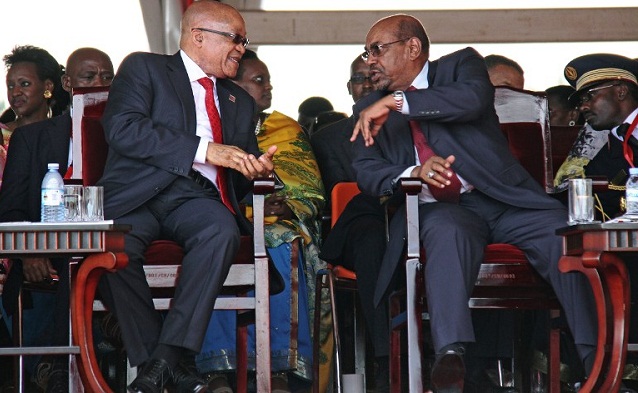
Sudanese President Omar al-Bashir returned Thursday from a “short visit” toUganda, his first trip to Kampala since his International Criminal Court indictment in 2009 for alleged war crimes in Darfur.
Sudan’s official news agency SUNA had earlier reported that Bashir was on a two-day visit to Uganda, which is a signatory of the Hague-based International Criminal Court.
“From the start this was meant to be a short visit. It was only to attend a special event,” State Minister for Foreign Affairs Kamal Ismail told reporters at Khartoum airport after Bashir returned.
In Kampala, Bashir attended the swearing-in ceremony of President Yoweri Musevini, who took office for a fifth consecutive term.
Relations between Khartoum and Kampala have been strained for years amid accusations that both support rebel groups in each other’s country.
But after South Sudan won independence from Sudan in 2011, ties improved, with Museveni visiting Khartoum last year.
Sudan has previously accused Uganda of backing rebel groups in the south before independence as well as in the vast war-torn region of Darfur.
Several leaders of Sudanese rebel groups from Darfur still reside in Uganda.
Kampala for its part has accused Khartoum of supporting the Lord’s Resistance Army, a rebel group from Uganda.
Hours after he left for Uganda, rights group Amnesty International urged Kampala to arrest Bashir given that it has signed up to the ICC.
“Uganda must face up to its international obligations and arrest Omar Al-Bashir who is wanted on charges of genocide,” Amnesty’s director for East Africa, Muthoni Wanyeki, said in a statement.
“Failure to do so would be a breach of its duty and would be a cruel betrayal of the hundreds of thousands of people killed and displaced during the Darfur conflict.”
But Ismail said: “The visit was successful … The people of Uganda and officials of Uganda gave President Bashir an official and public welcome.”
Bashir was indicted by the ICC in 2009 for alleged war crimes in the Darfur region of western Sudan that he denies.
Darfur has been gripped by conflict since 2003, when ethnic minority rebels rose up against Bashir, complaining that his Arab-dominated government was marginalising the region.
Bashir launched a brutal counter-insurgency, in which at least 300,000 people have been killed and 2.5 million forced to flee their homes, according to figures released by the United Nations.
 The Independent Uganda: You get the Truth we Pay the Price
The Independent Uganda: You get the Truth we Pay the Price



